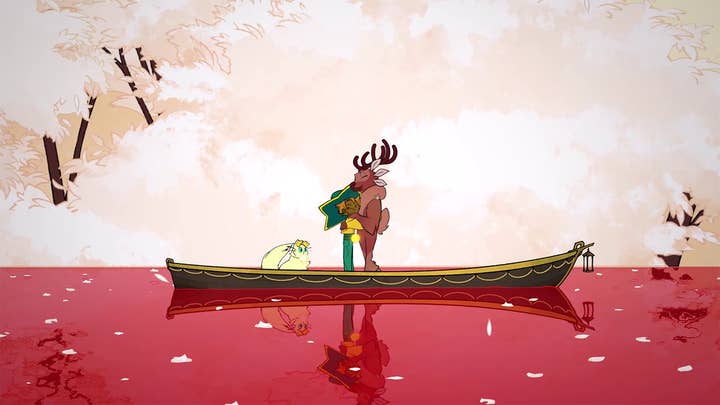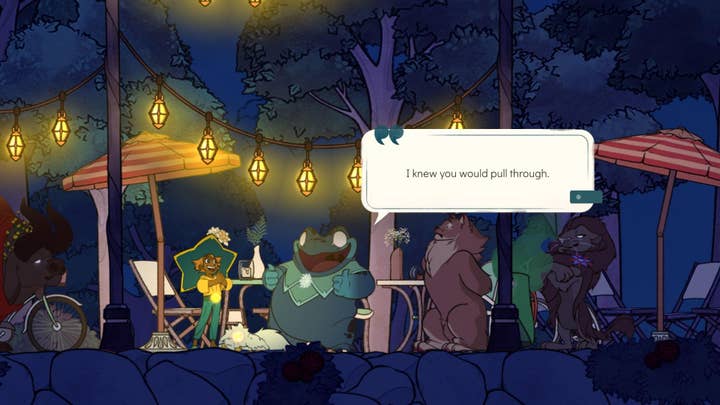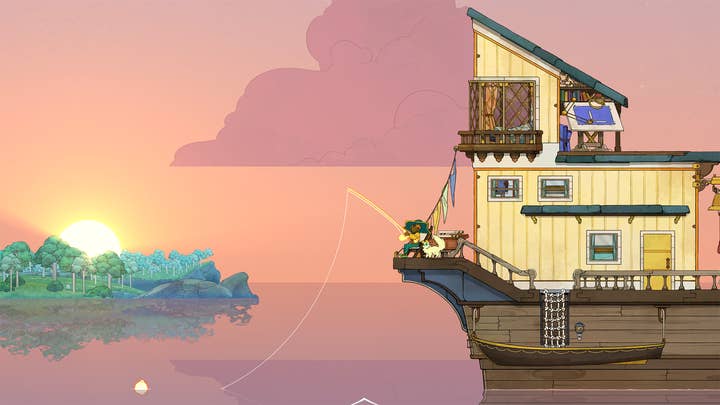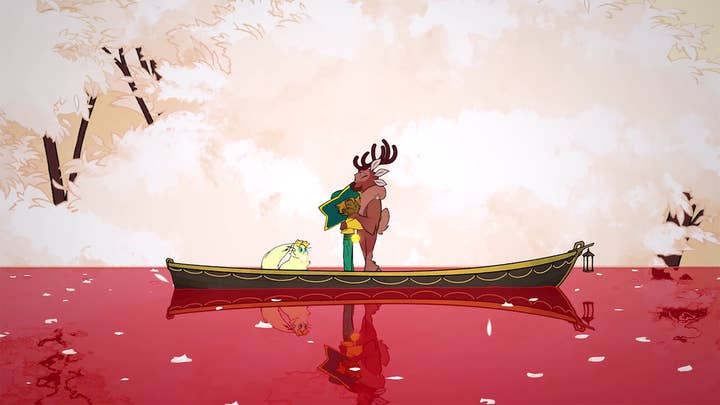Lessons learned from the success of Spiritfarer
Thunder Lotus' Nicolas Guérin and Rodrigue Duperron reflect on the journey of the million-selling indie hit
For any indie team to make a million-selling game is a rare achievement. But when the game is centered on a subject as difficult as grief, loss and dying -- and launched into the teeth of a global pandemic -- it's especially noteworthy.
Spiritfarer is a game about making friends with people who are dying, and then helping them cope with their journey onwards. It's a cozy world of gentle hues, where humans take the form of animals who care for one another, and where the player builds a world around favors and relationships.
It's also based on the development team's own stories about loved ones who have passed on; cherished memories of grandparents whose lives and personalities left a great impression. They are celebrated in the dramatic personas of great characters, including an owl, a lynx, and a hog, all of whom have led storied lives.
In December, Montreal-based publisher and developer Thunder Lotus Games -- which employs around 30 people -- announced that it had come to the end of the game's post-launch life of updates and DLC, with the release of the Farewell Edition. Its status as a million-selling indie hit was celebrated by the media, which has generally been enthusiastic about the game since its first reveal at E3 in 2019.

Spiritfarer was the company's third release, following combat adventure Jotun (2015), and dark metroidvania Sundered (2017). While both those games were likable, and commercially viable, neither of them suggested an incoming hit of Spiritfarer's scale.
The game's post-reveal journey is instructive, because it frames the potential for independent developers to find major success outside gaming's power fantasy mainstream. Not only is the game about sadness, it's also difficult to describe in genre terms.
Mostly, it's compared with another massive hit from 2020, Animal Crossing: New Horizons, though there are marked differences between the two. Most notably , Spiritfarer has a sophisticated overarching narrative about the nature and brevity of human existence.
Creative director Nicolas Guérin (formerly of Ubisoft) says the game's sales "outweighed quite heavily" initial expectations. Break-even point was set at somewhere between 200,000 and 300,000 units.

The reveal
A big catalyst was Microsoft, which signed the game for Xbox Game Pass, and then promoted it heavily during its 2019 E3 show, which included Keanu Reeves' appearance on behalf of Cyberpunk 2077, as well as showpieces for Halo Infinite and Gears 5.
Guérin acknowledges that the Xbox Game Pass team was probably in the market for something "with a cozy tone" to set against the usual E3 blam-blam, but it was still a risk. Fans and journalists were impressed with the initial trailer.
"There was a strength about the gentle colors of the game, the mellowness of music," he says. "It felt like a safe space within the chaos of E3."
Marketing and publishing director Rodrigue Duperron was in the audience during the reveal, watching the show while monitoring social media reactions.
"An indie game at E3 feels like a tiny little thing," he recalls. "You hope that you're going to be one of those games that is remembered and, and isn't just something 'meh' while you wait for the next big explosion game. People were interested and wanted to know more, which is the best thing you could ask for."

Messaging
But even with the warm reception, Duperron and the team were acutely aware that Spiritfarer could easily become lost and forgotten. "I was rarely comfortable during the campaign," he says. "There was always a fear that people wouldn't understand what we were doing or, if they did understand, wouldn't be interested because they want to play the next Doom, or whatever."
The game's complexities and subtleties weren't addressed much at E3, and most of the marketing came down to allowing people to play at influencer events like PAX. The elevator pitch was always honest and straightforward.
"The first sentence of every description of this game is just us saying 'it's about dying'," says Duperron. "And then you watch a couple of seconds of the trailer you're like 'oh, yeah, it really is about dying'."
Community outreach
As a company, Thunder Lotus was spawned through a successful Kickstarter campaign for Jotun. Like many indies of the recent past, much attention is paid to keeping the community in the loop.
"As community managers, we're constantly explaining the game, and that helps keep the pitch in plain language," says Duperron. "We'd always had a dialogue with players, but we'd never made a game with this kind of emotional register, and we learned how to talk about it. It helped us to see the value of wearing our hearts on our sleeves."
"The most impressive thing to me was the amount of love we received from players"Nicolas Guérin
Spiritfarer was released on Xbox, PlayStation 4, PC, and Switch in August 2020. Like many indie games, its success wasn't about launch day pizzazz, but about word-of-mouth. Players found that the game helped them process their own memories of loss, and they felt empowered to share their stories.
"The most impressive thing to me was the amount of love we received from players," says Guérin. "The amount of letters, the amount of emails we read in which players talked about their own experiences with loved ones, and with relatives who passed away, and how it affected them. People felt like they were able to be honest and to open up. We had allowed ourselves to be vulnerable in making the game, and players responded to this in the same way."

The pandemic effect
The team showed an almost-complete version of the game at PAX East at the end of February 2020. By then, it was clear that COVID-19 was going to have an enormous effect on everyone's lives. Like every other game company, the team coped with the practicalities of lockdown.
Even though holding the release wasn't a realistic financial option, they discussed what it would mean to launch a game about dying, during a deadly pandemic.
"The game isn't exploitative [of death] in any sort of way," says Duperron. "It wasn't like the pandemic invented death. The subject matter and the writing of the game was inspired by loss that we had all experienced in direct ways that predated the pandemic."
By the time the game came out, Animal Crossing: New Horizons had demonstrated how a suffering public wanted to play games centered on the humanity of helping others. "People really needed solace and experiences that felt like hugs, like emotion," he adds. "That comforted us as well. We had no illusions about fixing things or helping people process what was basically a terrible time. But we felt we were doing the right thing, and our hearts were in the right place."
"We found that announcing content updates was interesting to the press, and people would talk about the game again. It became a virtuous circle"Nicolas Guérin
Post-launch updates
After release, various DLC updates were released which fixed what the team saw as underlying narrative issues, as well as adding new characters and stories. The updates were all free.
Guérin says there was never any question about putting a price on the DLC. The updates were made possible only by the game's financial success.
"If the game had not done so well, we'd have probably been forced to move on," he says. "But we had more stories to tell that really tugged on our heartstrings."
He adds: "We found that announcing content updates was interesting to the press, and people would talk about the game again. It became a virtuous circle."
A major change was the addition of the character Lily, in the spring 2021 update. She is sister to the main character Stella, and it is through her (represented as a cloud of butterflies) that the player really understands the story's metaphorical status.
"The overarching metaphor wasn't strong enough. We felt we could do a better job," explains Guérin.

A corrected error
One change in the game was more controversial. An owl character called Gustav originally spoke about death as freeing him from his original life in a wheelchair. The developers were accused of using ableist language. The writers changed Gustav's dialog and apologized.
Guérin recalls: "Sometimes when you create something and it's criticized, your first reaction is to be defensive. A lot of developers will say, well, it's the internet and everyone has an opinion. But that's a silly knee-jerk reaction. You have to get over it as quickly as possible, so that you can really listen to people and understand where they are coming from."
With the help of the organization AbleGamers, the team listened to a range of views before deciding that they had made a mistake, and that it needed to be rectified.
"Video gaming is a commercial industry. But in situations like this, sales and PR reputation should not be a consideration. We knew we had to tackle [criticism] in the most honest way possible," Guérin continues.
Duperron says it would have been preferable if the team had not made the error in the first place, but sees it as an opportunity going forward: "We're allowed to make mistakes, and people are allowed to call us on those mistakes. An important lesson from that process is to try to avoid it, by doing better. We should have taken the time to step back and consider it before putting it out in the world. Because some people might get hurt. I still feel terrible about it."
Thunder Lotus has yet to announce its next game, but the company is now a keen proponent of sensitivity advisers who can help writers understand diverse perspectives.
"I don't have all the answers," says Duperron, "but being open and honest about your limitations, and seeking out help, is always a step forward."
